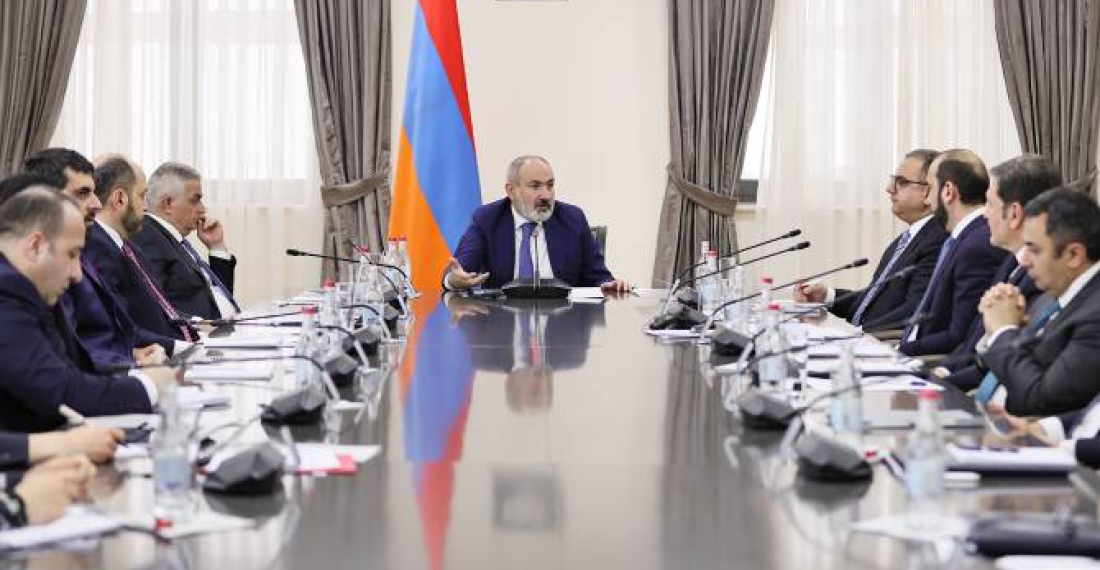On Monday, 8 January, Armenian Prime Minister, Nikol Pashinyan, visited the country's Ministry of Foreign Affairs where he reviewed the work of Armenian diplomacy in 2023.
The office of the Prime Minister of Armenia, as cited by Armenpress news agency, said that Minister of Foreign Affairs Ararat Mirzoyan and the deputy ministers presented the work carried out in their coordination directions, the plans and priorities for the current and next year.
Accordingly, a detailed reference was made to the measures, achievements, and the steps taken to overcome the challenges during the year 2023, which is characterized by geopolitical and regional developments.
Reference was made in 2023. particularly, in the conditions of the blocking of the Lachin Corridor since the beginning of the year, the ethnic cleansing policy of Azerbaijan against the people of Nagorno-Karabakh, the steps taken by RA in the situation created by the military attack in September. Addressing the rights and needs of more than 100,000 Armenian population forcibly displaced from Nagorno-Karabakh and issues of interaction with international partners in that direction were observed.
Reference was made to efforts and processes aimed at ensuring stability and peace in the South Caucasus.
The steps taken to strengthen cooperation with partner states at the bilateral level and the existing results were presented to the RA Prime Minister. It was emphasized that the efforts of the RA Foreign Ministry were aimed at closer cooperation with a wide geography, both with neighboring countries and those countries with which friendly ties have already been formed, as well as with those countries with which the development of cooperation has a tangible potential, both economic and in other areas. In this context, the visits and contacts that gave new charge and content to the development of the agenda, bilateral and multilateral platforms with the respective countries were mentioned. It was emphasized that relations in various directions have been raised or are moving to a qualitatively new level, including strategic dialogue, and in that sense, the year was full of events and activities of their own format. It was recorded that 34 high-ranking visits were made to the Republic of Armenia during the year, and 68 visits were made by RA high-ranking officials, 40 of which were by the Minister of Foreign Affairs.
The RA Prime Minister was also presented with the works and results of international peace and security, development cooperation, protection of human rights, expansion of multilateral cultural cooperation, as well as the promotion of RA candidacies in various structures.
Among other initiatives, the works carried out in the direction of popularization of the "Crossroads of Peace" project developed by the RA government, including through about 2500 publications in the international press, were also presented.
2024 were also presented. the planned international events and the financial costs planned in that direction.
Issues related to the opening of new RA diplomatic and consular institutions in RA, as well as abroad, were addressed.
Extensive, targeted works carried out in the direction of improving the working conditions, including the building conditions, of the central apparatus of the MFA and the bodies of the RA diplomatic service abroad were also presented. It was emphasized that the digitization of consular services continued within the framework of the digital agenda, as a result of which the possibility of online payments, queuing and providing relevant documents was introduced.
Emphasizing the importance of strengthening the capabilities of the diplomatic service, the programs for equipping the foreign political department with diplomatic personnel, as well as training programs for foreign diplomats at the RA Diplomatic School, were also presented. Reference was made to ongoing and ongoing reforms in the MFA system, possible steps to increase the attractiveness of the diplomatic service. In this context, Prime Minister Pashinyan emphasized that the diplomatic service is special in its nature and emphasized the process of enriching the potential of the service in the medium and long term, including the process of supplementing it with young and special professional personnel.
After the presentation of the report, an exchange of ideas took place. The future plans and tasks of the Ministry of Foreign Affairs in several directions were outlined.
Prime Minister Pashinyan emphasized the continuous development of the diplomatic service in line with current global trends.
"The highest goal of Armenia's foreign policy is to ensure and guarantee Armenia's sovereignty, independence, territorial integrity," said the Prime Minister. Nikol Pashinyan also emphasized the need to maximize the use of the economic component of foreign policy and gave instructions to those responsible.
source: commonspace.eu with Armenpress news agency (Yerevan)
photo: Armenian prime minister Nikol Pashinyan at a meeting with the country's top diplomats in Yerevan on 8 January 2024.







